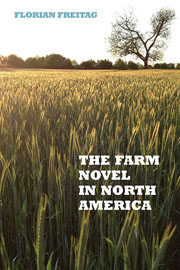 The Farm Novel in North America
The Farm Novel in North America Published online by Cambridge University Press: 05 December 2013
Naturalism is commonly said to have found its way to North America, and more specifically to the United States, around the turn of the twentieth century, when in their works writers such as Stephen Crane, Frank Norris, Theodore Dreiser, and Jack London started to portray the influence of heredity and natural drives, social milieu and environment, and the pressures of the moment upon the behavior of the protagonists.
As a genre, however, the farm novel presents something like a conceptual impasse for such definitions of naturalism as a distinct era of North American literary history and as the literary expression of a deterministic worldview, as farm novels continued to be written long after the period of naturalism had supposedly ended with the beginning of the First World War and as the farm novel constitutes an inherently naturalistic genre. Hardly any other environment or setting exerts, after all, a more complete influence upon the actions of human beings than the farm with its daily and yearly rhythms and cycles. Simply by portraying life on the farm, structured as it is by agricultural tasks, the farm novel represents the “natural” form of expression for literary naturalism. Some North American farm novels make this connection explicit by using nature's rhythms and cycles as structural devices, naming chapters and sections after seasons or the months of the year. Particularly in Canadian farm novels, the deterministic impact of the farm setting upon the characters also serves as a major thematic concern, as the English Canadian farm novel focuses on the protagonists' struggle for control over nature and the roman de la terre fictionalizes agriculturalism's rigid system of deterministic geographies and place-based identities.
To save this book to your Kindle, first ensure [email protected] is added to your Approved Personal Document E-mail List under your Personal Document Settings on the Manage Your Content and Devices page of your Amazon account. Then enter the ‘name’ part of your Kindle email address below. Find out more about saving to your Kindle.
Note you can select to save to either the @free.kindle.com or @kindle.com variations. ‘@free.kindle.com’ emails are free but can only be saved to your device when it is connected to wi-fi. ‘@kindle.com’ emails can be delivered even when you are not connected to wi-fi, but note that service fees apply.
Find out more about the Kindle Personal Document Service.
To save content items to your account, please confirm that you agree to abide by our usage policies. If this is the first time you use this feature, you will be asked to authorise Cambridge Core to connect with your account. Find out more about saving content to Dropbox.
To save content items to your account, please confirm that you agree to abide by our usage policies. If this is the first time you use this feature, you will be asked to authorise Cambridge Core to connect with your account. Find out more about saving content to Google Drive.